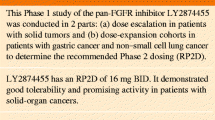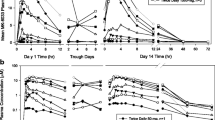Summary
Background The MET tyrosine kinase and its ligand, hepatocyte growth factor (HGF) also known as scatter factor, are associated with tumourigenesis and metastasis by promotion of scattering, proliferation, angiogenesis, motility and invasion. ASLAN-002 is a potent inhibitor of MET as well as related kinases. A phase I dose escalation study was conducted to determine the safety and pharmacokinetics of ASLAN-002 in patients with advanced cancer. Methods Patients with advanced or metastatic solid tumours, who had progressed on standard therapy or for whom standard therapy was not known, were administered ASLAN-002 orally. The starting dose was 100 mg once daily (QD) with subsequent cohorts to receive doses of 200 mg QD, 300 mg QD, 450 mg QD, 600 mg QD, 300 mg twice daily (BID), 450 mg BID, and 600 mg BID. Results Forty patients were included across 7 dose cohorts. Cohort 8 (600 mg BID) was not opened due to the lack of appreciable pharmacokinetic (PK) differences between 300 mg BID and 450 mg BID and higher incidences of grade 3 or 4 adverse events (AE) in Cohort 7 (450 mg BID). Fifteen patients (37.5%) experienced a grade 3 or 4 AE. The most commonly reported AEs were nausea (55%), fatigue (47.5%) and constipation (30%). One dose limiting toxicity (DLT) of atrial fibrillation was observed with 450 mg BID. Conclusions ASLAN-002 is well tolerated at 300 mg BID and is the recommended dose for future phase II studies (RP2D). Clinical Trials Registry Number: NCT01721148.


Similar content being viewed by others

References
Ponzetto C, Bardelli A, Zhen Z, Maina F, dalla Zonca P, Giordano S, Graziani A, Panayotou G, Comoglio PM (1994) A multifunctional docking site mediates signaling and transformation by the hepatocyte growth factor/scatter factor receptor family. Cell 77(2):261–271
Benvenuti S, Comoglio PM (2007) The MET receptor tyrosine kinase in invasion and metastasis. J Cell Physiol 213(2):316–325. https://doi.org/10.1002/jcp.21183
Christensen JG, Burrows J, Salgia R (2005) C-met as a target for human cancer and characterization of inhibitors for therapeutic intervention. Cancer Lett 225(1):1–26. https://doi.org/10.1016/j.canlet.2004.09.044
Sierra JR, Tsao MS (2011) C-MET as a potential therapeutic target and biomarker in cancer. Ther Adv Med Oncol 3(1 Suppl):S21–S35. https://doi.org/10.1177/1758834011422557
Maulik G, Shrikhande A, Kijima T, Ma PC, Morrison PT, Salgia R (2002) Role of the hepatocyte growth factor receptor, c-met, in oncogenesis and potential for therapeutic inhibition. Cytokine Growth Factor Rev 13(1):41–59
Blumenschein GR Jr, Mills GB, Gonzalez-Angulo AM (2012) Targeting the hepatocyte growth factor-cMET axis in cancer therapy. Journal of clinical oncology : official journal of the American Society of Clinical Oncology 30(26):3287–3296. https://doi.org/10.1200/JCO.2011.40.3774
Schroeder GM, An Y, Cai ZW, Chen XT, Clark C, Cornelius LA, Dai J, Gullo-Brown J, Gupta A, Henley B, Hunt JT, Jeyaseelan R, Kamath A, Kim K, Lippy J, Lombardo LJ, Manne V, Oppenheimer S, Sack JS, Schmidt RJ, Shen G, Stefanski K, Tokarski JS, Trainor GL, Wautlet BS, Wei D, Williams DK, Zhang Y, Zhang Y, Fargnoli J, Borzilleri RM (2009) Discovery of N-(4-(2-amino-3-chloropyridin-4-yloxy)-3-fluorophenyl)-4-ethoxy-1-(4-fluorophenyl )-2-oxo-1,2-dihydropyridine-3-carboxamide (BMS-777607), a selective and orally efficacious inhibitor of the met kinase superfamily. J Med Chem 52(5):1251–1254. https://doi.org/10.1021/jm801586s
Cui JJ (2014) Targeting receptor tyrosine kinase MET in cancer: small molecule inhibitors and clinical progress. J Med Chem 57(11):4427–4453. https://doi.org/10.1021/jm401427c
Eyob H, Ekiz HA, Welm AL (2013) RON promotes the metastatic spread of breast carcinomas by subverting antitumor immune responses. Oncoimmunology 2(9):e25670. https://doi.org/10.4161/onci.25670
Maroun CR, Rowlands T (2014) The met receptor tyrosine kinase: a key player in oncogenesis and drug resistance. Pharmacol Ther 142(3):316–338. https://doi.org/10.1016/j.pharmthera.2013.12.014
Gallo S, Sala V, Gatti S, Crepaldi T (2014) HGF/met Axis in heart function and Cardioprotection. Biomedicine 2(4):247–262. https://doi.org/10.3390/biomedicines2040247
Mistry B, Nishioka Y, Fan J, Verbel D (2011) Abstract A193: assessment of effect of low- and high-fat diet on E7050 pharmacokinetics and characterization of E7050 pharmacokinetics after 100 mg, 200 mg, and 400 mg single oral doses in healthy subjects. Mol Cancer Ther 10(11 Supplement):A193–A193. https://doi.org/10.1158/1535-7163.targ-11-a193
Nguyen L, Holland J, Mamelok R, Laberge MK, Grenier J, Swearingen D, Armas D, Lacy S (2015) Evaluation of the effect of food and gastric pH on the single-dose pharmacokinetics of cabozantinib in healthy adult subjects. J Clin Pharmacol 55(11):1293–1302. https://doi.org/10.1002/jcph.526
Scagliotti G, von Pawel J, Novello S, Ramlau R, Favaretto A, Barlesi F, Akerley W, Orlov S, Santoro A, Spigel D, Hirsh V, Shepherd FA, Sequist LV, Sandler A, Ross JS, Wang Q, von Roemeling R, Shuster D, Schwartz B (2015) Phase III multinational, randomized, double-blind, placebo-controlled study of Tivantinib (ARQ 197) plus Erlotinib versus Erlotinib alone in previously treated patients with locally advanced or metastatic Nonsquamous non-small-cell lung Cancer. J Clin Oncol Off J Am Soc Clin Oncol 33(24):2667–2674. https://doi.org/10.1200/JCO.2014.60.7317
Solomon BJ, Mok T, Kim DW, Wu YL, Nakagawa K, Mekhail T, Felip E, Cappuzzo F, Paolini J, Usari T, Iyer S, Reisman A, Wilner KD, Tursi J, Blackhall F, Investigators P (2014) First-line crizotinib versus chemotherapy in ALK-positive lung cancer. N Engl J Med 371(23):2167–2177. https://doi.org/10.1056/NEJMoa1408440
Bang YJ, Wu-Chou S., Nam, D.H., Lim, W.T., Bauer, T.M., Brana, I., Poon, R.T.P., Hong, D.S., Lin, C.C., Peng, B., Zhang, Y., Zhao, S., Kumar, A., Akimov, M. and Ma, B. Phase I study of the safety and efficacy of INC280 in patients with advanced MET-dependent solid tumors. Abstract 2520. In: ASCO, Chicago, 2014
Lolkema MP, Bohets HH, Arkenau HT, Lampo A, Barale E, de Jonge MJ, van Doorn L, Hellemans P, de Bono JS, Eskens FA (2015) The c-met tyrosine kinase inhibitor JNJ-38877605 causes renal toxicity through species-specific insoluble metabolite formation. Clinical cancer research : an official journal of the American Association for Cancer Research 21(10):2297–2304. https://doi.org/10.1158/1078-0432.CCR-14-3258
Infante JR, Rugg T, Gordon M, Rooney I, Rosen L, Zeh K, Liu R, Burris HA, Ramanathan RK (2013) Unexpected renal toxicity associated with SGX523, a small molecule inhibitor of MET. Investig New Drugs 31(2):363–369. https://doi.org/10.1007/s10637-012-9823-9
Faivre S, Raymond E, Stammberger U, Sarholz B, Bladt F (2015) Tepotinib (MSC2156119J) monotherapy in patients with MET-positive advanced hepatocellular carcinoma with Child-Pugh Class A liver function who have failed sorafenib treatment: phase Ib/II trial. Annals of Oncology 26 (suppl 4):iv34-iv34. doi:https://doi.org/10.1093/annonc/mdv233.118
Choueiri TK, Escudier B, Powles T, Mainwaring PN, Rini BI, Donskov F, Hammers H, Hutson TE, Lee JL, Peltola K, Roth BJ, Bjarnason GA, Geczi L, Keam B, Maroto P, Heng DY, Schmidinger M, Kantoff PW, Borgman-Hagey A, Hessel C, Scheffold C, Schwab GM, Tannir NM, Motzer RJ, Investigators M (2015) Cabozantinib versus Everolimus in advanced renal-cell carcinoma. N Engl J Med 373(19):1814–1823. https://doi.org/10.1056/NEJMoa1510016
Smith DC, Smith MR, Sweeney C, Elfiky AA, Logothetis C, Corn PG, Vogelzang NJ, Small EJ, Harzstark AL, Gordon MS, Vaishampayan UN, Haas NB, Spira AI, Lara PN Jr, Lin CC, Srinivas S, Sella A, Schoffski P, Scheffold C, Weitzman AL, Hussain M (2013) Cabozantinib in patients with advanced prostate cancer: results of a phase II randomized discontinuation trial. J Clin Oncol Off J Am Soc Clin Oncol 31(4):412–419. https://doi.org/10.1200/JCO.2012.45.0494
Smith M, De Bono J, Sternberg C, Le Moulec S, Oudard S, De Giorgi U, Krainer M, Bergman A, Hoelzer W, De Wit R, Bogemann M, Saad F, Cruciani G, Thiery-Vuillemin A, Feyerabend S, Miller K, Houede N, Hussain S, Lam E, Polikoff J, Stenzl A, Mainwaring P, Ramies D, Hessel C, Weitzman A, Fizazi K (2016) Phase III study of Cabozantinib in previously treated metastatic castration-resistant prostate Cancer: COMET-1. J Clin Oncol Off J Am Soc Clin Oncol 34(25):3005–3013. https://doi.org/10.1200/JCO.2015.65.5597
Molife LR, Dean EJ, Blanco-Codesido M, Krebs MG, Brunetto AT, Greystoke AP, Daniele G, Lee L, Kuznetsov G, Myint KT, Wood K, de Las Heras B, Ranson MR (2014) A phase I, dose-escalation study of the multitargeted receptor tyrosine kinase inhibitor, golvatinib, in patients with advanced solid tumors. Clin Cancer Res 20(24):6284–6294. https://doi.org/10.1158/1078-0432.CCR-14-0409
Spigel DR, Edelman MJ, O'Byrne K, Paz-Ares L, Mocci S, Phan S, Shames DS, Smith D, Yu W, Paton VE, Mok T (2017) Results from the phase III randomized trial of Onartuzumab plus Erlotinib versus Erlotinib in previously treated stage IIIB or IV non-small-cell lung Cancer: METLung. J Clin Oncol Off J Am Soc Clin Oncol 35(4):412–420. https://doi.org/10.1200/JCO.2016.69.2160
Iveson T, Donehower RC, Davidenko I, Tjulandin S, Deptala A, Harrison M, Nirni S, Lakshmaiah K, Thomas A, Jiang Y, Zhu M, Tang R, Anderson A, Dubey S, Oliner KS, Loh E (2014) Rilotumumab in combination with epirubicin, cisplatin, and capecitabine as first-line treatment for gastric or oesophagogastric junction adenocarcinoma: an open-label, dose de-escalation phase 1b study and a double-blind, randomised phase 2 study. The Lancet Oncology 15(9):1007–1018. https://doi.org/10.1016/S1470-2045(14)70023-3
Cunningham D, Tebbutt NC, Davidenko I, Murad AM, Al-Batran S-E, Ilson DH, Tjulandin S, Gotovkin E, Karaszewska B, Bondarenko I, Tejani MA, Udrea AA, Tehfe MA, Baker N, Oliner KS, Zhang Y, Hoang T, Sidhu R, Catenacci DVT (2015) Phase III, randomized, double-blind, multicenter, placebo (P)-controlled trial of rilotumumab (R) plus epirubicin, cisplatin and capecitabine (ECX) as first-line therapy in patients (pts) with advanced MET-positive (pos) gastric or gastroesophageal junction (G/GEJ) cancer: RILOMET-1 study. Journal of Clinical Oncology 33 (15_suppl):4000–4000. https://doi.org/10.1200/jco.2015.33.15_suppl.4000
Mok TS, Geater SL, Su WC, Tan EH, Yang JC, Chang GC, Han M, Komarnitsky P, Payumo F, Garrus JE, Close S, Park K (2016) A randomized phase 2 study comparing the combination of Ficlatuzumab and Gefitinib with Gefitinib alone in Asian patients with advanced stage pulmonary adenocarcinoma. Journal of thoracic oncology : official publication of the International Association for the Study of Lung Cancer 11(10):1736–1744. https://doi.org/10.1016/j.jtho.2016.05.038
Funding
This study was funded by Aslan Pharmaceuticals Pte Ltd.
Author information
Authors and Affiliations
Corresponding author
Ethics declarations
Conflicts of interest
Aflah Roohullah declares he has no conflicts of interest; Adam Cooper declares he has no conflicts of interest; Anna Lomas declares she no conflicts of interest; Jennifer Aung declares she has no conflicts of interest; Alan Barge, Lilian Chow and Mark McHale are employees of Aslan; Jayesh Desai declares he has no conflicts of interest; James Whittle declares he has no conflicts of interest; Ben Tran declares he has conflicts of interest; Paul de Souza declares he has no conflicts of interest; Lisa Horvath declares she has no conflicts of interest.
Ethics approval
All procedures performed in studies involving human participants were in accordance with the ethical standards of the institutional and/or national research committee and with the 1964 Helsinki declaration and its later amendments or comparable ethical standards.
Informed consent
Informed consent was obtained from all individual participants included in the study.
Rights and permissions
About this article
Cite this article
Roohullah, A., Cooper, A., Lomax, A.J. et al. A phase I trial to determine safety and pharmacokinetics of ASLAN002, an oral MET superfamily kinase inhibitor, in patients with advanced or metastatic solid cancers. Invest New Drugs 36, 886–894 (2018). https://doi.org/10.1007/s10637-018-0588-7
Received:
Accepted:
Published:
Issue Date:
DOI: https://doi.org/10.1007/s10637-018-0588-7



